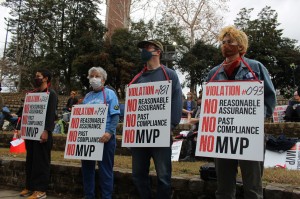From an Article by Sarah Vogelsong, Virginia Mercury, December 14, 2021
A divided Virginia State Water Control Board approved a necessary stream-crossing permit for the embattled Mountain Valley Pipeline Tuesday despite opponents’ hopes that its record of environmental violations would tank it.
The board voted 3-2 to issue a Virginia Water Protection Permit to MVP, with board members Paula Jasinksi and Ryan Seiger dissenting. Board chair Heather Wood and member Jillian Cohen were absent.
“The facts show that remaining waterbody crossings can be completed successfully and without adverse impacts to sensitive resources as the project team has proposed,” Mountain Valley spokesperson Natalie Cox wrote in a statement. “In fact, Mountain Valley already has successfully performed multiple crossings of waterbodies and wetlands in Virginia, without adverse impacts to water quality.”
The approval came as a blow to pipeline opponents, who have long argued that there is no need for the natural gas the project will supply and that it will continue to cause environmental degradation along its 107-mile path through Giles, Craig, Montgomery, Roanoke, Franklin and Pittsylvania counties.
“We’re fighting against communities being disrupted. We’re fighting against monies being diverted to fossil fuel companies that ought to be put in health care and put in the creation of green jobs,” civil rights leader the Rev. William J. Barber II said in a fiery speech at an anti-pipeline rally Saturday in Richmond.
Opponents have particularly pointed to Virginia Attorney General Mark Herring’s 2018 lawsuit against Mountain Valley over violations related to erosion and sedimentation. The suit was settled in 2019 with Mountain Valley agreeing to pay a $2.15 million penalty and submit to third-party environmental monitoring.
“While there were a number of violations … we’re told by our [erosion and sedimentation] folks that these violations are not ongoing and regular and that they’re being addressed shortly after they’re identified,” Dave Davis, director of the Department of Environmental Quality’s Office of Wetlands and Stream Protection, told the board Tuesday.
Furthermore, he added, state regulations outline “nine reasons to deny a VWP permit, but not one of those is to deny a permit based on past violations of erosion and sediment limits. This permit we believe complies with state law and regulations,” he said.
However, the nonprofit Wild Virginia, which has fought the project since its inception, said its own analysis of Virginia Department of Environmental Quality inspection reports has shown that Mountain Valley has violated environmental rules more than 1,500 times during its existence.
“The DEQ has consistently failed to acknowledge the magnitude of these problems or take effective action to stop them,” the group said in a statement. “DEQ’s description of MVP’s record of violations to the board was inaccurate and woefully incomplete.”
Tuesday’s approval of the Virginia Water Protection permit was the latest chapter in Mountain Valley’s long and twisting road to getting — and keeping — water-crossing approvals. Under the federal Clean Water Act, pipelines have to obtain federal and state permits that guarantee they will not significantly degrade water quality during either construction or operation.
Initially Mountain Valley met the federal requirement when the Army Corps of Engineers verified that the project met the criteria laid out in Nationwide Permit 12, a general “blanket” permit that authorizes types of activities around the country that are considered to have only minimal adverse effects on the environment. The project got Virginia’s approval from the State Water Control Board in December 2017.
In 2018, however, a Richmond-based federal appeals court overturned the federal approval. Subsequently, a federal court in Montana halted the entire Nationwide Permit 12 program.
During the intervening time, Mountain Valley changed course, opting instead to seek individual stream-crossing permits from Virginia.
According to DEQ figures, the project will temporarily impact 315 stream crossings and four acres of wetlands and permanently impact two stream crossings and two acres of wetlands. “The state law says that we’re only to look at those crossings that have a drainage area of five square miles or greater. However, we looked at every single one,” said Davis. “We conducted a crossing-by-crossing review.”
Peter Anderson, Virginia policy director for environmental and economic nonprofit Appalachian Voices, said in a statement that despite Tuesday’s vote, “the Mountain Valley Pipeline still has a long and uncertain road ahead.”
The project still needs stream-crossing authorizations from West Virginia’s Department of Environmental Protection and the U.S. Army Corps of Engineers, as well as an approval from the Federal Energy Regulatory Commission allowing it to bore underneath waterways.
Tuesday’s water board vote stood in stark contrast to a vote earlier this month by Virginia’s State Air Pollution Control Board to deny a state air permit for a compressor station that would be a key part of an offshoot of the Mountain Valley Pipeline.
The air board based its denial on the conclusion that the permit would not meet either environmental justice or site suitability requirements outlined in state law or articulated by the 4th Circuit Court of Appeals in its overturning of a permit for the now-canceled Atlantic Coast Pipeline.
Speaking before the water board, however, DEQ Division of Water Permitting Director Melanie Davenport said the “factual situation” regarding environmental justice was “a little bit different” when it came to the consideration of stream crossings.
“In the limited number of cases where this issue has come up under permitting, there is a distinction to be made between a 107-mile linear project versus a specific site project,” said Davenport. “In other words, there is no fenceline community because there is no stationary specific source.”
No public comment was accepted during Tuesday’s meeting after the board held two days of public comment in Radford and Rocky Mount in September.
xxx

